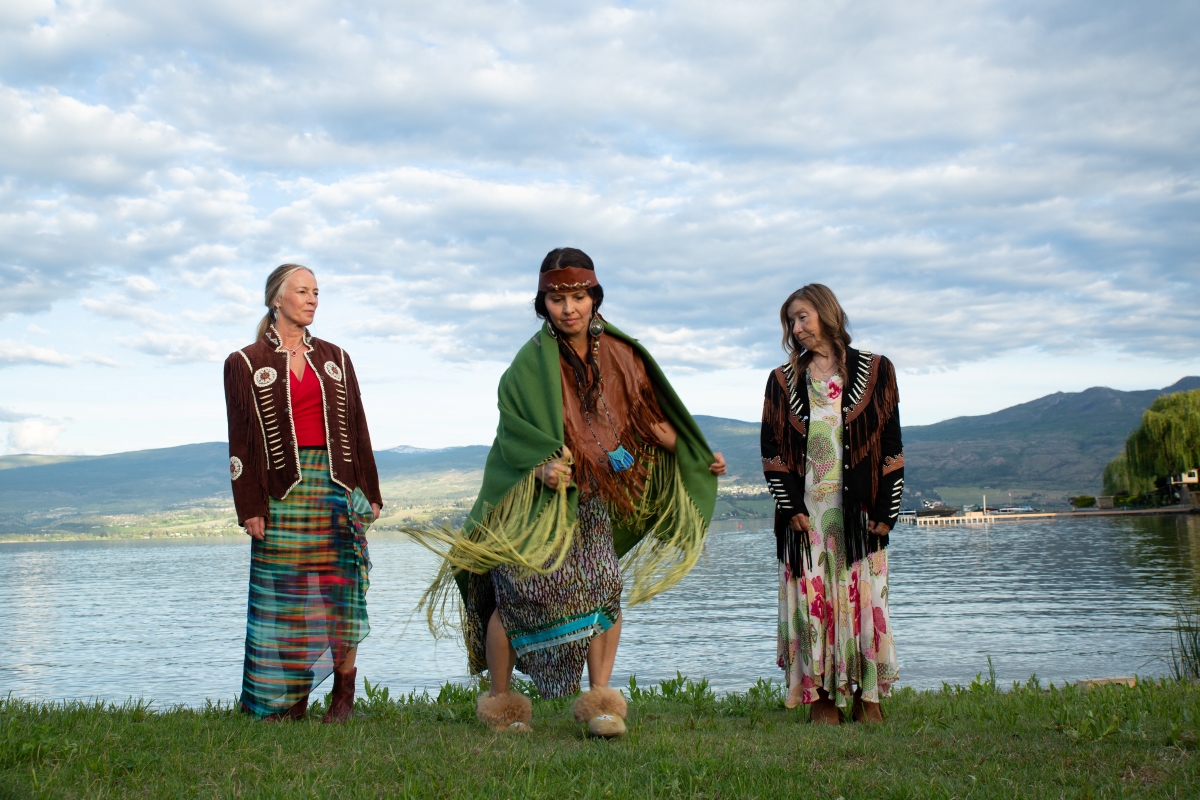The Lake / nx̌aʔx̌aʔitkʷ
(Canada, 115 min.)
Dir. John Bolton
Opera is not everyone’s cup of tea. John Bolton’s latest musical-documentary The Lake may not appeal on the surface to many, but this hybrid doc holds some rewards for patient viewers—assuming they can indeed be patient.
Bolton has built a career focused on quirky docs that explore musical creations (see: 2016’s joyfully unhinged Aim for the Roses). In The Lake, he trains his lens on a revival of the eponymous 1950s Canadian opera. Heather Pawsey, a Canadian opera singer, discovered the unperformed hand-written libretto and score at the Canadian Music Centre in 1995 while in grad school. After singing one of its arias for a musical competition, she became obsessed with producing the opera in its original setting in BC’s Okanagan Valley, on Kelowna’s Westbank. But she quickly encountered an issue that would interweave itself deeply with the play’s second life: half of the characters in the libretto were Indigenous, and the story, which dealt with themes of Syilx (Okanagan First Nations) culture and spirituality, demanded collaboration. The film’s standout participant is the collaborator Pawsey found, Delphine Derickson, a Syilx (Westbank First Nation) Elder whose charisma and insight light up every scene in which she’s featured.
Working together, Pawsey and Derickson, along with a group of both settler and Syilx dancers, composers, and singers, set out to “decolonize” the opera for its first stage performance in Kelowna in2014. The results are debatable. Though Syilx drumming, singing and culture were incorporated, the libretto went unchanged, and its 19th-century-set script still carried racist tropes; but more interesting for Bolton’s film are the issues of representation the production raised since no Indigenous singers were cast for the Syilx roles.
Unfortunately, The Lake spends much of the first half of its overlong runtime in digressions that are interesting but ultimately distracting (technical details about the score, background on the composer’s pioneering activist interests). The frame of the opera’s story is also never entirely revealed, which is a crucial misstep in a film bursting with references.
Through talking-heads interviews and sung re-enactments, we eventually learn that “The Lake” is based on the life of Susan Allison and her husband, two of the first white settlers in the Okanagan in the 1870s, though we never learn exactly what about their lives was worthy of an opera. We also learn the play is tethered to Syilx legend about a lake-spirit called nx̌aʔx̌aʔitkʷ, which non-Indigenous people might call an “Ogopogo,” but further context on the legend role in the story is never fully elucidated until the film’s end. The water-spirit is critical to the film as it serves as a bridge into revealing conversations with Westbank First Nation members about their culture. But without this background earlier on, what seems intended as an important through-line falls flat and leads to what disappointingly feel like tangents. By the time we get to the final operatic re-enactment at the story’s end, it’s difficult to piece together what “The Lake” is actually about.
Bolton’s film is not without merit despite these stumbles. The film shines in its focus on Syilx feelings about the outsiders entering their culture and producing an opera, of all things, from the cultural commingling. There are obvious parallels with the original encounter of colonization–highlighted by a couple of cringe-worthy reflections from some of the opera’s white cast–and Bolton does an admirable job of mining this context for insightful discussions about the politics of settler-Indigenous relations. Ultimately, The Lake is a meaningful attempt to be many things: a history of a rare Canadian opera and its contemporary revival, part musical-documentary, and at least partially a work on the complexities inherent in respectful cross-cultural collaboration. It doesn’t entirely cohere across these forms but that’s not for lack of trying. And if the thread gets lost somewhere along the way, the music may be enough for opera lovers not to mind.
The Lake premieres at DOXA on May 6.












